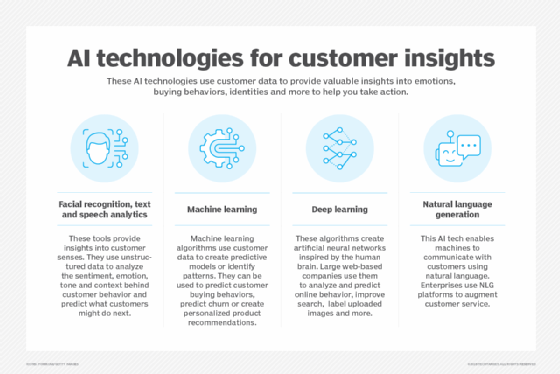AI for customer experience powers gains at enterprises
Customer experience is growing more central to enterprises' digital strategies, and AI is increasingly driving much of their engagement and retention efforts.
The fight for customer attention grows ever fiercer, and increasingly, companies are turning to AI to connect customer experiences across every single touch point throughout the entire customer lifecycle. AI for customer experience is helping brands create more tailored experiences for their customers, creating everything from personalized emails and streamlined interactions with chatbots to tailored products and pricing.
Improving customer satisfaction through targeted content
Email, push notifications and pop-ups are an effective and affordable way to communicate with customers. However, they are often generic, sent too often and, as a result, deleted without being read. Until recently, companies needed to guess the time, channel and message that would resonate with customers. However, now, with the use of AI, there is a better way.
Through the combination of big data and AI-powered predictive analytics, companies can now obtain comprehensive customer profiles to better understand their customer wants, needs, buying behaviors and preferred channels of interaction. AI algorithms track online behavior, including interaction with websites, email, push notifications and navigation systems that produce relevant metrics to figure out customer behavior. Through robust data gathering, enterprises can then use AI for customer experience to create highly personalized messaging and experiences.
In one example, Starbucks is using detailed profiles to customize interactions with its customers and provide a more positive customer experience. A few years ago, Starbucks changed its rewards system from a visits-based program to a spend-based program. As part of the new offer system, Starbucks was able to move from pushing 30 variations of email offers a day to over 400,000 highly personalized variants per week, increasing customer engagement and driving up sales. The company has also used its customer profiles to provide deeper research into the popularity of products, insight into how different locations are performing and labor optimization for anticipated customer flows. This all goes to keeping customers satisfied.

Reducing the frustration of search
Brands are also deploying AI technologies to make experiences as personal and frictionless as possible, helping consumers search more efficiently for relevant products. Websites are increasingly using AI-powered suggestion tools that help customers search and browse the page with ease. With so many options, customers can feel paralyzed when making a purchasing decision. For many product categories, there are just too many options and features to choose from, which can lead some customers to abandon the purchase process. AI for customer experience is helping gently guide customers with customized products and service recommendations, making the customer feel more at ease through the buying experience.
Additionally, companies are deploying machine learning algorithms to properly match customers to the products they're more likely to use based on a variety factors, such as previous communication, prior purchase behaviors, source referral, geographic location and other relevant factors. Then, algorithms deliver personalized pricing to customers or potential buyers.
Assisting with customer support
AI-powered chatbots are having a very positive impact for companies all types. These bots can proactively start conversations with customers, provide relevant information and help with each touch point throughout the entire customer lifecycle. Chatbots streamline the sales process, resolve problems and answer customer questions on demand. No longer do customers need to wait hours to get their questions answered or basic issues resolved.
Additionally, chatbots can transfer a caller to a customer service agent if a human is needed in the loop. This increases productivity and enables agents to only handle the more complex cases, instead of dealing with mundane or easily answered questions, such as package tracking info, store hours or return policies.
In the context of customer experience, the chatbot is increasingly being used to replace human customer support staff. Chatbots can provide a consistent, always-positive interaction with customers and round-the-clock support and service when human assistants are not available. The relatively low cost chatbot implementation compared to human customer support makes them attractive to many companies.
Concerns over data tracking
The use of AI to power customer experience provides many positive benefits. So much so that, according to a report by the National Business Research Institute in partnership with Narrative Science, over 62% of businesses planned on using AI in customer service in 2018. With the ever increasing use of AI by brands, there's no doubt that AI's place in customer experience is here to stay.
However, this tailored content can also raise concerns for people who think brands already have too much information about their customers and their buying behaviors. The increasing use of AI will exacerbate those concerns as people see the results of their online activity reflected in promotional campaigns, targeted messaging and offers that are clearly driven by previous buying or search behavior.
People are rightfully concerned with how much information companies have on them and how this data is used. While it's hard to say how much individuals will push back over the use of their data for promotional purposes, it's clear that AI for customer experience is already proving to have the ability to greatly enhance the overall customer journey.








